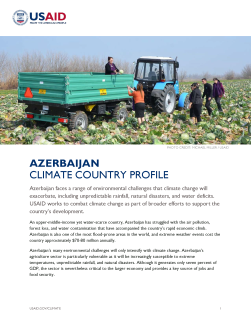FACT SHEET – Azerbaijan faces a range of environmental challenges that climate change will exacerbate, including unpredictable rainfall, natural disasters, and water deficits. USAID works to combat climate change as part of broader efforts to support the country’s development.
Azerbaijan is an upper-middle-income country. Air pollution, forest loss, and water contamination have accompanied the country’s rapid economic climb and will only intensify with climate change. Despite being a water-scarce, Azerbaijan is also one of the most flood-prone areas in the world, and extreme weather events cost the country approximately $70-80 million annually.
Azerbaijan’s agriculture sector is particularly vulnerable to climate change as it will be increasingly susceptible to extreme temperatures, unpredictable rainfall, and natural disasters. Although it generates only seven percent of GDP, the sector is nevertheless critical to the larger economy and provides a key source of jobs and food security.
Government of Azerbaijan Climate Priorities
In 2023, the Government of Azerbaijan committed to a 40 percent reduction in emissions by 2050 in its revised Nationally Determined Contributions (NDCs), conditional on international support. The country’s energy sector generates more than half of Azerbaijan’s greenhouse gas emissions. Azerbaijan also aims to reduce emissions from land use, forestry, waste, industrial processes, and agriculture.
The country’s National Adaptation Plan is projected to be finalized in 2024, and the Ministry of Ecology has determined three key areas for priority attention in the adaptation space—agriculture, water, and coastal areas. In addition, Azerbaijan has implemented Nationally Appropriate Mitigation Actions that will focus on retrofitting buildings for energy efficiency, modifying the transport fleet to be more eco-friendly, and capturing more gas emissions from the oil industry.
USAID Partnership with the Government of Azerbaijan
USAID has partnered with the Government of Azerbaijan to advance climate resilience through initiatives focused on climate-smart agriculture and energy reform. By promoting sustainable farming practices, USAID’s collaboration with the Government of Azerbaijan enhances food security and agricultural productivity while reducing environmental impacts. USAID supported the development and implementation of a new electricity market law in the energy sector, fostering a more competitive, efficient, and cleaner energy system. These efforts align with the Government of Azerbaijan’s broader climate goals and help drive economic growth while addressing climate-related challenges.
Climate-Smart Agriculture
USAID/Azerbaijan’s agriculture-focused Private Sector Activity (PSA) facilitates private sector engagement, mobilizes investment, and promotes the adoption of climate-smart agricultural practices. In a country where 80 percent of agricultural production occurs in desert or semi-arid regions—and where 47 percent of soil suffers from nutrient deficiency and erosion—these efforts play a vital role. USAID supports agribusinesses in improving crop yields, enhancing quality standards, and expanding access to both domestic and international markets. By advancing modern technologies and sustainable farming practices, USAID-funded agricultural programming also contributes to climate change mitigation and adaptation and supports Azerbaijan’s goals for economic diversification and ecological resilience.
Key Results
USAID has helped:
- Stage a series of training events attended by more than 15,000 farmers and implement 11 demonstration plots across Azerbaijan through PSA, promoting innovative, climate-smart agricultural practices to tackle climate change, improve soil health, and boost agricultural sustainability
- Advance efficient water management by introducing modern drip irrigation and smart systems with soil moisture sensors to facilitate precision agriculture and improve both yield and product quality
- Improve the capacity of institutions like Azerbaijan State Agricultural University, establishing agrometeorological stations that enable farmers to optimize irrigation, forecast pest and disease outbreaks, and improve crop management, reducing environmental impact.
- Promote crop rotation practices to maintain soil fertility, disrupt pest and disease cycles, and decrease reliance on chemical inputs to reduce soil erosion, improve soil fertility, and enhance carbon sequestration
Key Programs
Electricity Market Law
With USAID’s support, the Government of Azerbaijan liberalized its electricity market, which led to the 2023 adoption of a new electricity generation law to promote renewable energy expansion. The law replaces 1998 legislation, ends the government’s electricity monopoly, and removes key barriers to renewable energy growth.
The new law is expected to:
- Introduce market principles to the electricity sector and align Azerbaijan’s regulations with the European Union;
- Overhaul the electricity market in three stages to attract private and foreign investment to the renewable energy sector; and
- Foster innovation, create new economic opportunities for the private sector, and improve governance of the renewable energy sector.
For More Information




